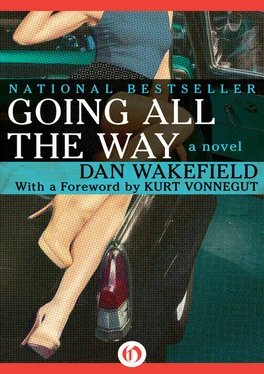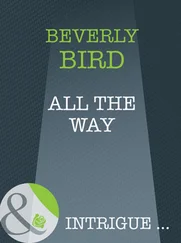“Maybe you could study that on the GI Bill,” Sonny said. “Art.”
“Could be. I dunno. I’m still thinking more of philosophy or something. I’d like to figure things out more.”
“Maybe you could do both. Philosophy and art.”
“Maybe. What I have to do is, I have to send in for some catalogs.”
“Which ones?”
“Colleges, universities. I think some of the big universities. Northwestern, Columbia, maybe even Harvard. See what they have.”
“They probably have about everything.”
“Yeh.”
“You thought about the ones around here? I.U., Purdue?”
“I dunno. I’d like to get away, see something different. Live in a real city. What about you?”
“I haven’t really thought, too much. I’d sort of thought of going to work at the Star . But the GI Bill—”
“Hell, yes, if the government’ll pay you to go any place and study, why not take advantage? Go someplace new?”
“Hell, yes,” Sonny said, feeling confident and casual. “Why not?”
“I can’t see settling down in Naptown forever. That’s for damn sure.”
Sonny, who had never seriously thought of anything else, said, “Well, I guess it depends on the person.”
Sonny realized, uncomfortably, that he didn’t even know which kind of person he was—the kind who stays home or the kind who goes away. He was twenty-three years old and didn’t even know that yet. He ordered another boilermaker and tried not to think about who he was. If anyone.
On the afternoon of the welcome-home dinner for Sonny, he took a long hot shower and put on his summer cord suit with a white shirt and tie.
“You didn’t have to get dressed up,” his mother said. “You’re the guest of honor, you ought to be comfortable.”
“I am,” he said.
“You could take off the coat and tie, if you want.”
“I don’t want.”
Actually the suit and tie made Sonny feel more protected; it was as if the more formal he appeared, the less chance the MRA bastards had of getting to him with their personal shit. He even wished he had a vest. He sat down in one of the big leather chairs in the den and lit a cigarette.
“Son?” His father was standing in the doorway, blushing a little and rubbing his thumbs across the tips of his fingers, the way he did when he had something personal to say. He cleared his throat. “I thought I’d fix a highball,” he said softly.
“Oh, good. Thanks, yes.”
Sonny looked away, not knowing how to show his appreciation without embarrassment, knowing his father was trying to help. Mrs. Burns didn’t drink at all, and Mr. Burns got terrible temper fits if he drank too much, but occasionally he had a highball of bourbon and soda or bourbon and ginger ale, and since Sonny started drinking in the open from the time of his sophomore year in college, Mr. Burns always offered a highball for him, too, on the rare occasions when he had one himself.
There had never been anything like a “cocktail hour” at the Burnses, or in fact much drinking of any kind at all. When Sonny was a kid growing up, the only drinking he ever saw in the house was at the family Christmas party with his father’s few relatives who had come up north to live from Kentucky. On these occasions, at some given signal, the men would leave the ladies alone in the living room and stealthily gather in the kitchen. Mr. Burns would take a pint bottle of whiskey out from its hiding place among the rags and cleaning-fluid cans in the broom closet, and the bottle would be passed from man to man, each one taking a swig from it and then breathing out a warm sigh of pleasure. During this ritual the men would never mention the liquor directly, though sometimes they referred to it by saying, “That’s real good Christmas cheer.” Mostly they would talk about hunting and fishing and business, manly subjects that the women didn’t understand. After the bottle was passed around a couple times to each man, Mr. Burns would replace the cap and slip it back to its hiding place in the broom closet. When the men returned to the living room, the women would giggle and one of them would say what have you boys been up to. The men would look flushed and pleased and pleasantly guilty, and the women would click their tongues and shake their heads in mock dismay.
Sonny figured his father needed a drink tonight almost as much as he did, what with the “MRA bunch” coming to dinner. Mr. Burns bore their presence as he did that of all the strangers who came under Alma’s wing for a while and were brought into the house like long-lost relatives—the alcoholics, the divorcees, the lonely newcomers to the city, the faith-seekers and faith-propagators, the bankrupt and the suicidal, even the two young homosexual hairdressers who held hands after dinner and said how wonderful it was to be taken into someone’s home and treated like people. Mr. Burns sat politely through it all, removing his glasses and pressing his thumb and forefinger on the bridge of his nose until Sonny sometimes thought he would press clear through it.
Mr. Burns came in with the drinks, and after he gave one to Sonny he held up his own glass, coughed nervously, and said, “Well, son, here’s more power to you.”
“Mmmm,” Sonny said, and took a long swallow of his drink. Thankfully, his father sat down.
“Well, you’ve finished your service,” he said.
“Yes, sir. It’s nice to have it done.”
“Lord, yes.”
They both took another drink. The walls seemed to buzz with silence. Sonny figured at least he was lucky that his father didn’t try to make him go into his own line of work like a lot of guys’ fathers did. Any idea of Sonny becoming an accountant and joining in some kind of business partnership with his father was settled long ago, back in grade school, when it turned out the one subject Sonny could hardly do at all was mathematics. He even flunked freshman algebra in high school, and it didn’t work out at all when his father tried to help him with homework. Mr. Burns would get angry when Sonny didn’t catch on; he seemed to take it as an insult that his son couldn’t understand the field that he made his own living in, the numbers and ledgers and calculations, the very tools of accounting, and yet the fact was the very sight of figures and equations made Sonny headachy and depressed. After the abortive homework sessions, Sonny and his father never discussed the subject. Mr. Burns seemed to regard photography as more of a hobby than a possible career, but he didn’t make any real complaints about Sonny’s talk of going into it.
“Well,” Mr. Burns said, “your future’s ahead of you.”
Sonny twisted in his chair, as if he had some kind of itch. “I guess it is,” he said.
He couldn’t think of anything to say. That’s the way it was when he and his father were alone together. It was as if both of them were in a stage play as Father and Son, but neither one knew his lines and neither was good at improvising. They were simply miscast in those roles, and yet they had to go on pretending to play them.
Sonny wasn’t really afraid of his father anymore, like he was as a kid when Mr. Burns had terrible fits of temper sometimes, turned an angry scarlet, and cursed and threw things. Yet it seemed that as Mr. Burns’ anger had subsided and he sought for truces with Alma rather than victories on any issue, his interest and his pleasure in things subsided too. Sonny had always sided with his mother as a kid, fearing the angry man who ruled their lives, but he had come more and more to feel sympathy and even sorrow for his father, glimpsing “his side of things.” The first such glimpse had come by accident, when Sonny was home from college one Christmas vacation and found in the basement, among dust-layered relics of his parents’ past, a thin black case that contained a rusty flute. When he took it upstairs and asked his parents where it had come from, his father turned pink with embarrassment and said, “Oh, I used to fool around with it, a long time ago.” Mrs. Burns laughed and said, “He used to practice on it when we first were married, but it gave me the heebie-jeebies. Ooof. All that high, trilly stuff. It hurt my head.” So his father had once been a music lover. Sonny also remembered his father getting books from the library long ago; he liked biography mostly, lives of great men like Theodore Roosevelt, Billy Sunday, and General John J. Pershing. When Sonny was in grade school the family listened to Dr. I. Q. on the radio every week, and Mr. Burns was very good at the biographical question, where they gave you hints about the life of a famous person and the contestant tried to guess who it was. Sonny was sure that Mr. Burns would have won a lot of silver dollars if he had ever got on the program. Though he didn’t get books from the library anymore, nor did he seem to care much about having a garden. He used to raise zinnias, hoeing the beds along the side of the small house where Sonny was a kid, cutting them sometimes for fresh bouquets. Now when he came home he usually sat in the den and watched television, and on weekends he slept late and then sat out on the breezeway, leafing through newspapers and dozing off into fitful dreams that would end with a sudden snort that shocked him awake, blinking like a frightened cat.
Читать дальше












